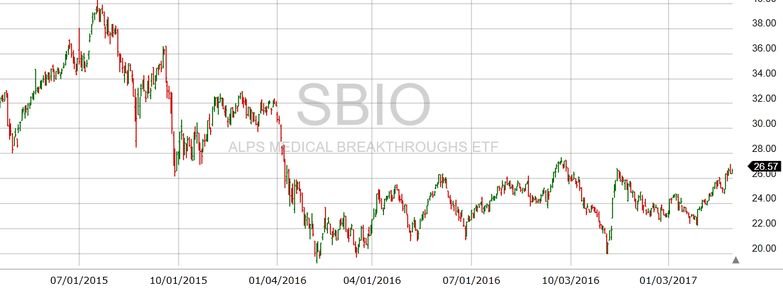Here's the kind of thing I do. I read about a promising gene therapy for sickle cell. It was announced days ago and the price of bluebird bio Inc (BLUE) already went way up (I don't mind an-hour-after-the-story up but not days-later up), which isn't bad if a cure actually happens but I don't rely on that, so I didn't buy. But studies are ongoing and future announcements could help the entire industry and investing in an industry fund is safer anyway. Health care changes are coming to the US, so I looked for an international or foriegn biotech fund and I found SBIO. That's high too, so I set an alert for when the price drops (trigger type: Price falls below $24.00, Note: Add cash to acct, set limit order to buy at 23). I set that limit based on this chart which seems predictable enough. I wouldn't wait for big biotech news to drive up the price before selling but that possibility is one reason I bought. I'd probably sell between $24 and $25.
At the core you are speculating. Sure, you mask it well by putting out technical analysis, but there's no real investing homework behind it. You're not looking at the business behind it; you're merely hoping to hit big on some idea. I've been there. Fortunately, I only lost $3700 on $4000 on two small investments in businesses I was sure were bound to take off based on single big ideas without knowing anything about the fundamentals behind the businesses themselves. A relatively inexpensive lesson.
You'll win some. You'll lose more. There's little about anything I've read in your strategies that leads me to believe you'll be a consistently good "stock picker", because if you look at those who've gone on to great, sustained investing success by picking stocks, they look at core fundamentals and buy with the intention of holding. What you're doing is something millions have done before. A few have gotten lucky, the vast majority do not and end up right where they started or worse after exhausting several years' worth of energy.
I'm reminded of the story a friend of mine told me back in 2005. We were co-workers; he joined the Navy a few years after I did. He told me stories of living on a boat in Mexico for a year after great success as a day trader in 1998-2000. He'd made a fortune of nearly $150 million.
But he kept going, and eventually lost all of it. Literally, every cent. He started over by going to Officer Candidate School, re-married, etc.
What struck me about his story was not his overwhelming success followed by the fall, it was his attitude about it. When I asked him if he thought day-trading and technical market analysis was smart, he said, "How many people do you know that made $150 million in less than two years?"
I said, "The same number of people who I know who lost $150 million in six months."
That pretty much ended the conversation.
You're going to be biased to focus on your wins and rationalize away your losses. In the end, you're going to be better off if you'd become a value investor (if you must buy individual stocks) or indexer. You're walking a path millions have walked before you, and only a few have succeeded, often just for the short run.
As ERD said, this is likely falling on deaf ears. Good luck!

